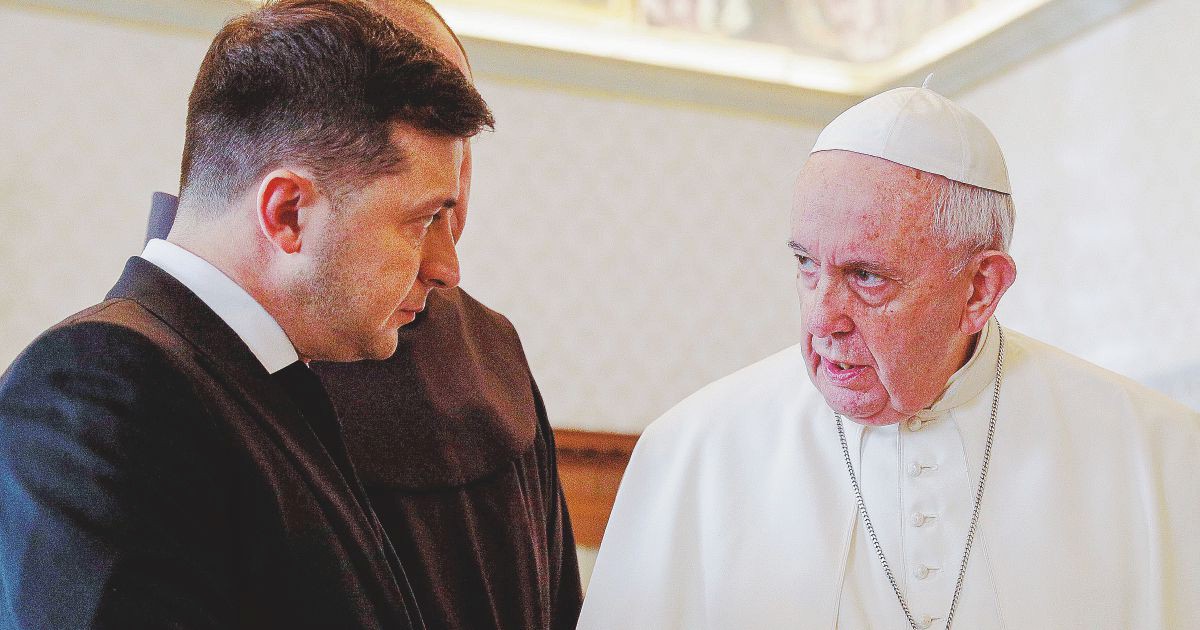The advances on a possible summit between Pope francesco and the Ukrainian president Zelensky over the next weekend they fell like a bolt from the blue. Just a few days ago, when the pontiff on his return from Hungary mentioned a Vatican “mission” to promote the “path of peace”, dry clarifications arrived from Moscow and Kyiv according to which nothing was known to the respective governments.
If, as they say, the two meet on Saturday in the apostolic palace it will be face to face historic. Zelensky, courageous leader of a Ukraine that was able to defeat Russia in the first phase of the invasion, preventing it from taking over Kyiv and to collapse the country, even reconquering pieces of territory occupied by the Russians, is the determined bearer of a one-way narrative: the Russian state is a state terroristPutin is a criminal who must be brought to stand, the Russia it should be treated as an international pariah and in perspective – as Ukrainian Prime Minister Denis Shmyhal has declared – the goal to be achieved is for Russia to be “democratised, demilitarized and denuclearised”. Simply put, all-out war until Russia is brought to its knees. Zelensky’s so-called peace plan, disclosed last year, is actually a long diktat item by item.
Francis’ line, as it has gradually developed in the 450 days of a war that is no longer Russo-Ukrainian but – according to the definition of the American political scientist Ian Bremmer – “hybrid war between NATO and Russia”, is antithetical. The pontiff is fully sympathetic to the suffering of the Ukrainian population and supports Kyiv’s right to sovereignty and independence. At the same time, Francis does not want to be a “chaplain of the West” and therefore places himself in the wake of Vatican diplomacy, used to evaluating things from a global. Francis knows that there is someone responsible for the conflict (Putin) but he is perfectly aware that every conflict has multiple roots and that it would be naive to close one’s eyes to the advance of Nato in Eastern Europe since the dissolution of the USSR.
Every great power – according to Vatican diplomacy – has its “legitimate concerns”. It applies to the United States that they would not tolerate a Mexico linked militarily to China and this applies to Russia, which asks that states directly on its borders (such as the Ukraine or Georgia) not become part of the Atlantic military apparatus. This is why Francis openly declares that the solution of the conflict cannot be entrusted to the block logic political-military and that instead the rebalancing of the world situation must be tackled head-on. Through a negotiation on new planetary rules. A type of Helsinki-2 conference. Similar to the Helsinki pact of 1975 which ensured peaceful coexistence between the United States and NATO countries on one side and the USSR and the Warsaw Pact countries on the other.
The Argentine pope knows that he has on his side that vast part of the world (majority by population) which, while rejecting the Russian attack on Ukraine, has no intention of enlisting under the banners of Washington. These are important countries: ChineseIndia, Brazil, South Africa, Pakistan, the Emirates and Saudi Arabia to name the main ones. It is a part of the world that is also irritated by the multiplication of sanctions that the West – like a schoolteacher, Kissinger would say – wants to impose on those who do not follow their own political line. This relevant part of the planet wants one political solution to the conflict that is causing an international economic crisis, an energy crisis, a food crisis.
“Using weapons to resolve conflicts is a sign of weakness and of fragility. Negotiating, proceeding with mediation and initiating conciliation requires courage,” Francis tweeted on April 24 at @Pontifex_it. “Nationalisms are roaring again”, he declared at the end of April during his visit to Hungary, denouncing that international politics seems to have “regressed to a sort of war infantilism”.
The Francesco-Zelensky summit is expected to talk first of all about the Vatican’s efforts to bring the thousands of children deported. And this will be the easy part of the meeting. The discussion of overall strategy will be much more complex and sophisticated. Bergoglio and Zelensky are two seasoned players. It’s going to be a tough chess game. The Ukrainian leader knows, however, that the majority of Italians she is against to a war adventure whose precise contours are unknown. He knows that even in Europe, at a popular level, doubts emerge that are carefully hidden in NATO and EU summit meetings. He knows that a large part of the business community in America is not at all enthusiastic about continuing the war. He knows that Trump he said he wanted to resolve the matter in 24 hours and that Elon Musk he proposed that the people of Donbass decide their fate in a referendum.
In the meantime, Francis sent a message to the president Putinentrusting it to the retired Russian ambassador Avdeev to whom he had gone at the beginning of the conflict to beg Moscow not to throw itself into the war adventure.
For Zelensky, on the eve of the counteroffensive announced too many times, it is essential to try to bring the pontiff at least symbolically in their own field in order to isolate Russia. For Francis, it is crucial to reach a ceasefire in order to start setting up peace negotiations. In the Rome headquarters of the Jesuit magazine, in the presence of the premier Georgia MelonsVatican Secretary of State Cardinal Pietro Parolin recently set the Vatican’s position in stone: “The only realistic solution is the negotiated. Conflict resolution does not come by polarizing the world between who is good and who is bad. The Holy See dialogues with everyone and believes in multilateralism”. Who has ears to hear, let him hear. In Rome, in Kyiv, in Brussels.
